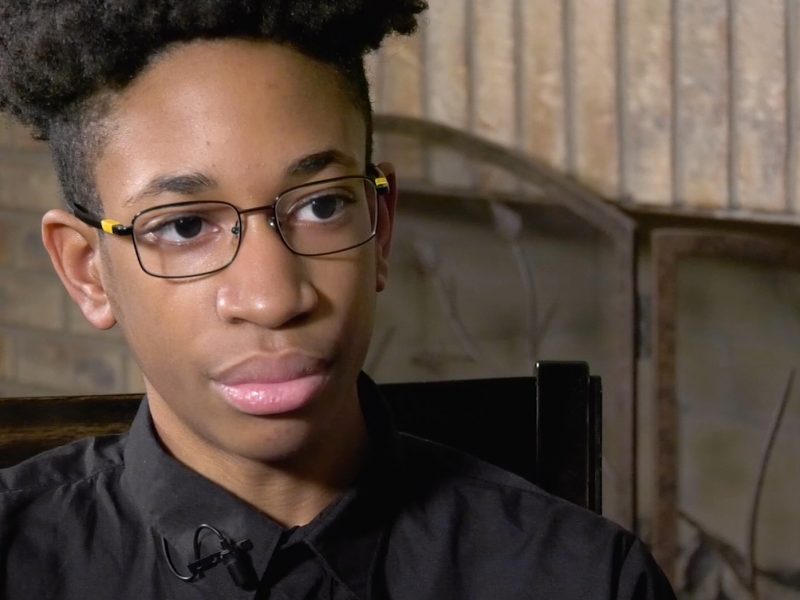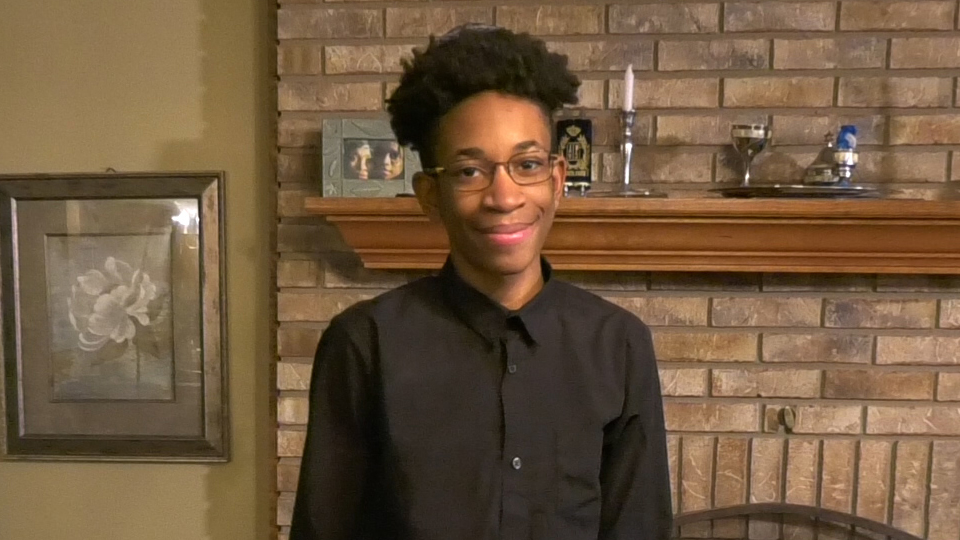David Harris

How You Help: Jonathan Finds His Voice
Federation’s JCRC Supports Local Family, School to Fight Antisemitism
“In the hallways when I was walking to my classes I could hear them commenting: ‘Hey, get in the oven,’ and: ‘yeah, that’s why your grandparents died in a fire,’ and how they were wishing that Hitler were still alive.” Slender and tall for his 14 years, wearing a kippah, Jonathan Jones speaks in a low, sincere voice.
The ninth grader is sitting in the living room of his family’s home talking about his experiences at a local middle school. The smell of newly baked challah is in the air—four loaves, plus several very little ones, evidently sized just for fun, for his three younger siblings. “They would also print out pictures of swastikas and they would have them in their binders, and I was scared to tell a teacher.” He did not want to be called a snitch, or get in even more trouble.
A long, difficult time to find his voice
It took Jonathan a long time to find his voice. He was only 11 when the incidents started. As a Jew of color, he was often considered not Jewish, despite his choice to sometimes wear a kippah. He was one of only two Jewish children in his class from sixth through eighth grade.
“Almost immediately [in sixth grade], because my son wanted to be outwardly Jewish, he began to experience negativity from other students—from antisemitism to racism to just, meanness,” said his mother, Arian Jones-Hall. The first time Jones-Hall talked to the school was when a student pushed Jonathan down on the playground, broke his glasses, and “called him an n-word Jew,” she said.
The antisemitic incidents kept happening regularly, about two times a week. Jones-Hall said that because the incidents were not witnessed or recorded, the school said it could do little except talk with the responsible teens—talks that changed nothing for her son, she said.
Jonathan started keeping his head down, and his voice quiet. “I was seeing my son deteriorate and becoming withdrawn and becoming unhappy, and wanting to distance himself from almost everything,” said Jones-Hall. Tearing up, she concluded, “It was really painful to watch.”
Jonathan recounts this isolating time in his life: “I wasn’t connected to stuff I cared about. I just felt that I didn’t want to do it anymore. I just gave up trying to tell people that [it] wasn’t okay.”
While his mother talked regularly and frequently with the school, it wasn’t until her rabbi suggested she contact the Jewish Community Relations Council—the non-partisan public affairs arm of the Jewish Federation of Cincinnati—that real change began happening at the institutional level.
The Jewish Community Relations Council (JCRC) helps the family and the school
The JCRC, led by director Jackie Congedo, spoke with the teachers, the principal, and the superintendent with the goal of education. But, as both Jones-Hall and Congedo say, it was a long, difficult process. The antisemitism kept happening, and the meetings, phone calls, and education kept being needed. Jones-Hall said, “I’m really thankful for all the work that Jackie did. All the phone calls, the emails. I mean, I call it a part-time job because we were meeting with the school so often, to try to work out a solution that would let my children feel safe.”
Congedo said, “I talked often with Jonathan and his mom. We met repeatedly with the school and provided training and education. We connected the school with anti-bias training that happened over the summer.”
Jones-Hall credits the JCRC with being the intervention that counted: “If the JCRC had not stepped in, I don’t see where the administrators would have been able to process that this is an issue. Just me on my own wouldn’t have been enough. I think that then, they really took things seriously, to the point that the middle school ended up hiring a mental health therapist to be there full time. Someone that children can actually talk to when these things are happening. This person did not exist for the three years my son was at the school.”
Jonathan speaks at the Freedom Center
Congedo asked Jonathan if he wanted to be on a panel on prejudice called Back to School Youth Symposium: Welcome to My World, on August 25, 2018, at the National Underground Railroad Freedom Center. He did; he wanted to share his experience. Congedo said, “That’s the strength of our JCRC. We have relationships in the broader community to connect members of the Jewish community with these important opportunities. It was a great opportunity to give Jonathan the chance to be part of a network that could support him as he deserved.”
His mom remembers the event, saying, “When Jonathon spoke at the Freedom Center, I was really proud of him for being able to speak about his own experience, to take what was meant to hurt him and use it to help other children like him. And to help the professionals better understand what children like him are going through.” When the event ended, she said, “So many of the people in the audience came up on the stage and surrounded him with so much love, from other synagogues, from the African American community. There was a teacher there from Fairfield schools, too, who connected with him.”
Jonathan’s advice to kids fighting antisemitism
Jonathan is in a better place today, and experiences less antisemitism. “I feel like people have matured a bit over the summer,” he said.
Asked what he would say to others in his situation, Jonathan said, “I would say to tell someone that they are close to, and if they have already told an adult about this, then, as my mom has said, just keep nagging them and keep collecting evidence. And eventually they’ll get tired and they’ll listen to you. And have people who will support you.”
Asked what he would say to the JCRC and the Jewish community, Jonathan said simply, “I would say thank you for supporting me, and I hope that in the future someday, if there are still people that are experiencing this, then I would like to help.”Thanks for caring about our community and what we do.
Stay connected: sign up for our newsletter here.

